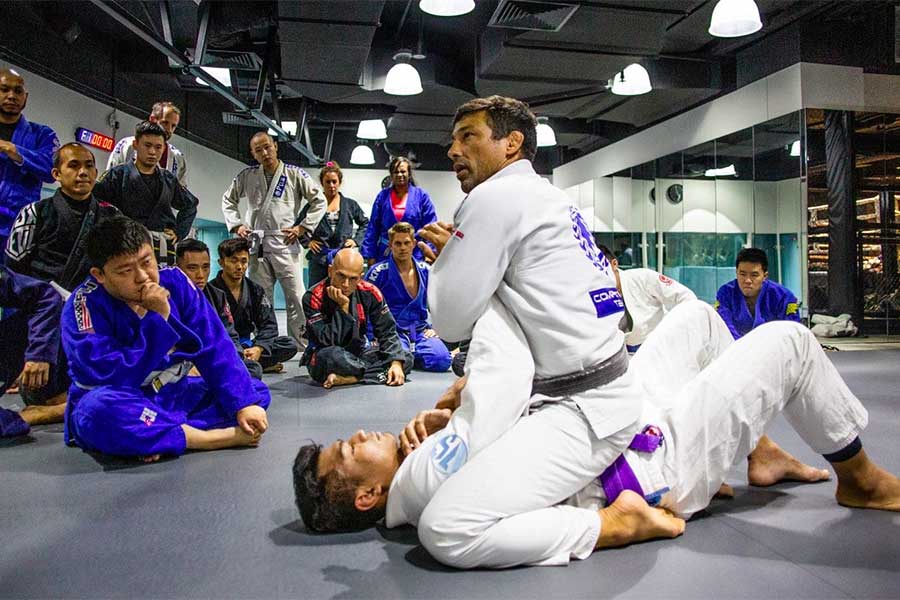It’s been a while since I had eczema, but you might be looking for relief. The good news is that your skin can heal (the bad news is that it takes patience). But what about training BJJ with eczema? Can you do it?
If you have mild eczema, the answer is yes! If your skin’s not too red or irritated and your doctor says it’s okay, there’s no need to avoid working out.
BJJ is an excellent cardio and strength workout, so go ahead if you can’t resist the urge to roll.
However, when your eczema flares up, it’s essential to take a break. It’s not just an issue of how the mat will feel against your skin — your skin needs time to rest and recover.
And if you’re feeling itching or irritated, it’s not going to be very pleasant for anyone involved (you may be tempted to scratch but please don’t).
Table of Contents
What is eczema?

Eczema symptoms vary from person to person, but generally, it starts with a red, itchy rash.
For many people, it’s similar to a mild flare-up of psoriasis. Psoriasis is another autoimmune skin condition; the difference is that there are no visible symptoms in psoriasis. You may have patches of thickened skin or visible flakes.
There is usually some degree of itching and burning, which can be brought on by rubbing the area or feeling slightly damp. The actual rash is typically red.
WHAT ARE THE CAUSES OF ECZEMA?
There are two principal varieties of eczema: atopic and contact. Atopic is a genetic predisposition, inheriting it from your family, which makes up around 80% of people with eczema.
It can be triggered by being too dry or too hot and stress, allergies, or infection. Contact is much more common and usually caused by an irritant in the environment.
How Can Eczema Affect BJJ Training?

Treating eczema can be a long process, and it’s essential to take breaks during flare-ups. If you’re experiencing severe itching or discomfort, it can affect your overall concentration in BJJ training and make it complicated to focus on the task at hand.
These distractions can lead to mental fatigue and even injury by letting your opponent gain the upper hand.
Additionally, because eczema can lead to skin cracking and bleeding, it increases the risk of infection. Furthermore, eczema can cause excessive sweating, leading to skin irritation and further flares.
don’t miss the Best bjj gis
Can You Still Compete In BJJ If You Have Eczema?
Your skin may and probably will get worse if you use your gi for competition, so I’d recommend against doing so.
That said—if you feel like you must compete in your gi, then at least wear rashguards underneath to protect your skin from further irritation.
However, some tournaments won’t let you wear a rashguard under the gi.
Is Eczema Contagious?
No. Your eczema doesn’t “get passed on.” It is a hereditary condition. Therefore lots of people think it is contagious.
It is not highly infectious, and if you have eczema, you probably don’t have it because of being around people with the condition.
Tips To Train BJJ With Eczema
KEEP THE SKIN WELL MOISTURIZED
One of the best ways to keep the skin well moisturized is by using a good moisturizer. There are many different kinds of moisturizers, so be sure to find one that works best for you.
If your skin is dehydrated, you may need to apply moisturizer multiple times a day. Additionally, you can try using a humidifier in your home to help keep the air moist and prevent the skin from drying out.
USE A BARRIER CREAM IF NEEDED
If your skin is sensitive or if you are experiencing a flare-up, you may benefit from using a barrier cream. Barrier creams help protect the skin from irritants and help reduce inflammation.
There are many different barrier creams available, so be sure to find the one that works for your skin condition.
AVOID ACTIVITIES THAT WILL CAUSE EXCESSIVE SWEATING
If you are experiencing a flare-up or sensitive skin, it is best to avoid any activities that will cause excessive sweating.
This includes strenuous exercise, like Brazilian Jiu-Jitsu, and hot weather and humid environments. By avoiding these triggers, you can help to keep the skin healthy and prevent any flare-ups.
WASH YOUR BJJ GI AND BELT OFTEN
One of the best ways to keep the skin healthy is by often washing your BJJ GI and belt. This will help remove any bacteria or irritants that may be causing problems.
Be sure to wash your gi and belt after each use, and if possible, try to air-dry them. If you can’t air-dry them, use a low-heat setting on the dryer.
SKIN CONDITIONS SIMILAR TO ECZEMA
Several skin conditions can cause similar symptoms to eczema. Some of these conditions include psoriasis, contact dermatitis, and seborrheic dermatitis.
If you are experiencing symptoms that resemble eczema, it is vital to see a doctor to get a proper diagnosis.
By getting a proper diagnosis, you can ensure that you treat the condition correctly and avoid any potential triggers.
Can You Train BJJ with Eczema?
While you can still train BJJ with eczema, take breaks between training sessions and limit contact with other people (especially those who have it) and the environment.
If you need a break from training from time to time, you may want to talk to your doctor or follow your dermatologist’s suggestions.
They should be able to give you some advice and treatments that will work for you. In the meantime, feel free to share this article with your grappling friends and family.




